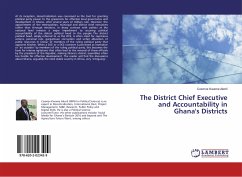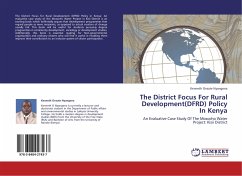At its inception, decentralization was conceived as the tool for granting political party power to the grassroots for effective local governance and development in Ghana, after several years of military rule. However, the appointment of the metropolitan, municipal and district chief executives rather than through elections, in sharp contrast with politics at the national level remains a major impediment to securing political accountability of the district political head to the people. The district political head, simply referred to as the DCE, is often cited for capricious actions, personal rule, gargantuan corruption and unfair allocation of public resources in favour of members of the ruling political party that appoints him/her. When a DCE or a DCE nominee is perceived as insensitive or 'an outsider' by members of the ruling political party, this becomes the basis for intense agitations that often lead to the removal of these officials by the president of the Republic, making Ghana's district assemblies often too hostile for effective development. The reader will find the discussions about Ghana, arguably the most stable country in Africa, very 'intriguing'.
Bitte wählen Sie Ihr Anliegen aus.
Rechnungen
Retourenschein anfordern
Bestellstatus
Storno








